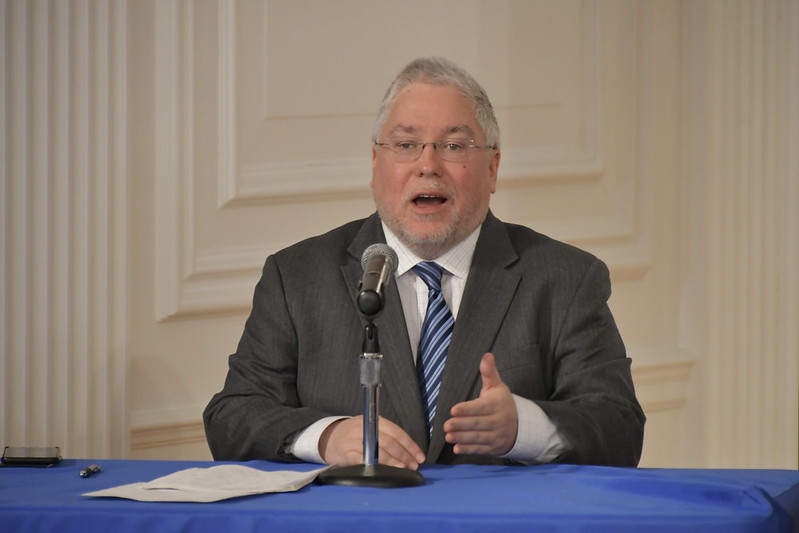States announced a $26 billion settlement with major prescription drug companies today, but West Virginia is a no.
Governments that decline participation in the settlement would opt out of near-term distribution of millions of dollars that could assuage drug crises in communities, but they could continue to pursue their own lawsuits against the drug companies.
Some smaller states like West Virginia have been critical of the settlement structure, which is largely based on population while giving less weight to places that have been inordinately affected by the drug crisis.
The settlement calls for funds to be split with 85 percent based on population size and 15 percent based on the severity of the crisis.
“West Virginia is a resounding no on these agreements and will continue to litigate and negotiate outside the framework of today’s announcement,” West Virginia Attorney General Patrick Morrisey stated Wednesday.
“I will keep fighting to protect West Virginia and will not allow larger states to dictate how we hold defendants accountable for their actions.”
Of the major companies in today’s announcement, West Virginia settled with McKesson in 2019 for $37 million, with Cardinal Health in 2017 for $20 million, and AmeriSourceBergen in 2017 for $16 million.
The other company in the broad settlement announced today is drug manufacturer Johnson & Johnson.
Local West Virginia communities such as the City of Huntington and Cabell County have been acting independently of the state. Huntington and Cabell are at the conclusion of a lengthy federal trial in Charleston over the role the companies played in the drug epidemic that swept communities.
“All of our actions and today’s opposition have positioned the state of West Virginia and local governments to fare very well. We have expressly carved the counties and municipalities out and positioned them and our Office to maximize a recovery that is based upon the severity of the harm imposed on West Virginians,” Morrisey stated today.
By saying NO to opioid agreements today and carving local governments out, West Virginia is well positioned to litigate & negotiate a package that really puts the needs of our citizens first. It’s a good day to be a West Virginian! I said we would protect WV interests and we are!
— Patrick Morrisey (@MorriseyWV) July 21, 2021
Attorneys general from other states appeared jointly today to laud the agreement, with Louisiana Attorney General Jeff Landry suggesting states that opt out may be shortsighted.
“Every day we don’t have the money to treat addiction we’re burying more and more people,” said Landry, a Republican. “We believe this was the best way to move forward. I think that states that don’t sign on are really being irresponsible. Instead of trying to make the most perfect settlement out there, we don’t want perfect to be the enemy of the good.
“Each and every day that goes by without these dollars is a day that someone is not being treated.”
Under the settlement announced Wednesday, distributors McKesson Corp, Cardinal Health Inc and AmerisourceBergen Corp would pay a combined $21 billion, while the drug manufacturer Johnson & Johnson would pay $5 billion. Each has been accused of being among the biggest corporate actors in the opioid crisis still ravaging communities across the country.
The settlement calls for establishing an independent clearinghouse of aggregated data about where drugs are going and how often. Negotiators hope the tool negotiators will help curtail overshipments of pills to communities.
The three distributors issued a joint statement denying allegations against them but supporting the resolution:
“While the companies strongly dispute the allegations made in these lawsuits, they believe the proposed settlement agreement and settlement process it establishes are important steps toward achieving broad resolution of governmental opioid claims and delivering meaningful relief to communities across the United States.”
More than 40 states are expected to support the nationwide settlement. The money from the distributors will be paid out over the next 18 years.
“The $26 billion agreement will bring desperately needed resources to each of our states,” said North Carolina Attorney General Josh Stein, a Democrat, during a briefing today with counterparts with other states.
He added, “We want to get these monies in our communities as quickly as possible and to the maximum amount possible because people are dying.”
Tennessee Attorney General Herbert Slatery, a Republican, emphasized cooperation that led to the settlement.
“All states and territories have a problem; they have a crisis,” Slatery said. “Every state has worked hard on this issue.”
Governments that opt out would likely continue pursuing litigation on their own, looking to the possibility of a windfall based on the effects of the opioid epidemic rather than a settlement formula based heavily on population.
States have 30 days to decide whether to sign onto the agreement. States and cities that sign on would drop thousands of lawsuits against the companies and pledge not to bring any future action.
Some states have already indicated they will opt out.
The attorney general in the State of Washington, Bob Ferguson, rejected participating. “The settlement is, to be blunt, not nearly good enough for Washington,” said Ferguson, a Democrat.

